Inspection logs at the Don Misenhimer splash pad revealed water chlorination readings were not documented on two of the three dates that the child was there in late August and early September, city officials said.
A child in North Texas has died from a rare brain-eating amoeba after visiting a splash park, and Arlington city officials now admit that there was lapse in the park’s daily inspection program and feel “personally responsible,” according to a published report.
“It’s completely unacceptable and it's devastating. Daily inspections were not occurring regularly at least two of the splash pads, either they weren’t recording their results or they simply weren’t going,” Arlington Deputy City Manager Lemuel Randolph told CBS Dallas Forth-Worth News reported.
On Sept. 5, a child, who was not identified, was hospitalized at the Cook County Medical Center with primary amebic meningoencephalitis (PAM), a rare and often fatal infection caused by the Naegleria fowleri amoeba. That same day city officials in Arlington and Tarrant County Health were notified and began to investigate closing all the city’s public splash pads, NBC News reported.
On Friday, water samples were taken from the Don Misenhimer Park splash pad confirmed by the Centers for Disease Control (CDC) the presence of the deadly amoeba in the water, and determined that the Arlington site was the likely source of the child’s exposure, according to reports.
Inspection logs at the Don Misenhimer splash pad revealed water chlorination readings were not documented on two of the three dates that the child was there in late August and early September, city officials said, NBC reported.
Arlington‘s chief epidemiologist Russ Jones told CBSDFW that the Naegleria fowleri amoeba is a bacteria that thrives in water that’s recirculated.
“When they recirculate it, there really needs to be two different types of disinfection to prevent this from happening,” Jones said.
Officials said Arlington’s drinking water supply was never impacted, a report said.
In the meantime, the city’s splash pads will remain closed for the remainder of the year, a report said.
Arlington Mayor Jim Ross was disturbed when he heard the news, CBSFDW reported. “It breaks my heart. I’m a father of 4. I’m a grandfather of 5 kids from 2 to 7 years old. I cannot imagine having to bury a child or grandchild like that,” he said.
The risk of N. fowleri infection is very low, with only 34 reported infections in the United States between 2010 and 2019, according to the CDC. And, health experts explain that if splash pads are properly maintained and operated safely they can be safe for children to play in.
A parent who frequently visits the Don Misenhimer Park splash pad with her young son was visibly upset upon hearing the news by a reporter from CBSDFW.
“I had no idea. It is very shocking and sad because there are so many kids that come here and so many families that depend on this,” she said.
According to the CDC, only one species-type of Naegleria infects people and that is Naegleria fowleri. It usually infects people when contaminated water enters their body through the nose.
Naegleria fowleri is a single-celled living organism, that is commonly found in warm freshwater lakes, rivers, and hot springs.
In rare instances, people can get infected if warm water from a disinfected swimming pool that has not been adequately treated with chlorine enters the nose, their website said.
“Once the amoeba enters the nose, it travels to the brain where it causes PAM, which is usually fatal,” the CDC said.
Symptoms of PAM may include a severe headache, fever, nausea, and vomiting. As the infection worsens, those infected can develop a stiff neck and experience seizures or hallucinations. After the start of symptoms, the disease progresses rapidly and usually causes death within about five days, the CDC said.






